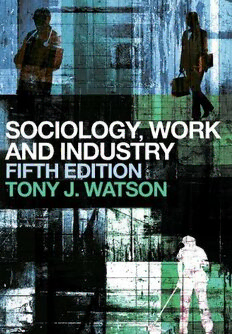
Sociology, Work and Industry: Fifth edition PDF
407 Pages·2008·3.865 MB·English
Most books are stored in the elastic cloud where traffic is expensive. For this reason, we have a limit on daily download.
Preview Sociology, Work and Industry: Fifth edition
Description:
This popular text effectively explains and justifies the use of the sociological imagination to understand the nature of institutions of work, occupations, organizations, management and employment, and how they are changing in the twenty-first century. With outstanding breadth of coverage, it provides an authoritative overview of both traditional and emergent themes in the sociological study of work; explains the basic logic of sociological analysis of work and work-related institutions and provides an appreciation of different theoretical traditions. It considers: the direction and implications of trends in technological change, globalization, labour markets, work organization, managerial practices and employment relations the extent to which these trends are intimately related to changing patterns of inequality in modern societies and to the changing experiences of individuals and families the ways in which workers challenge, resist and make their own contributions to the patterning of work and shaping of work institutions. New features include an easy to read layout, key issues questions, mini case studies, chapter summaries, and a fantastic Companion Website which is packed full of useful resources (for students and teachers). All of these elements – and much more – provide the reader with a text unrivalled in the field.
See more
The list of books you might like
Most books are stored in the elastic cloud where traffic is expensive. For this reason, we have a limit on daily download.
